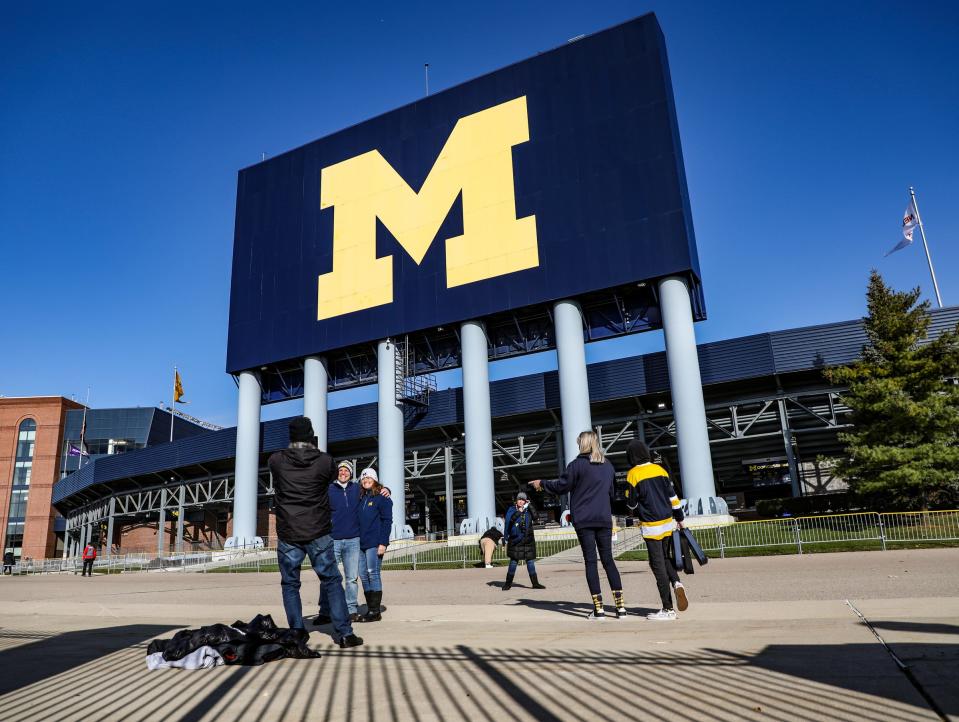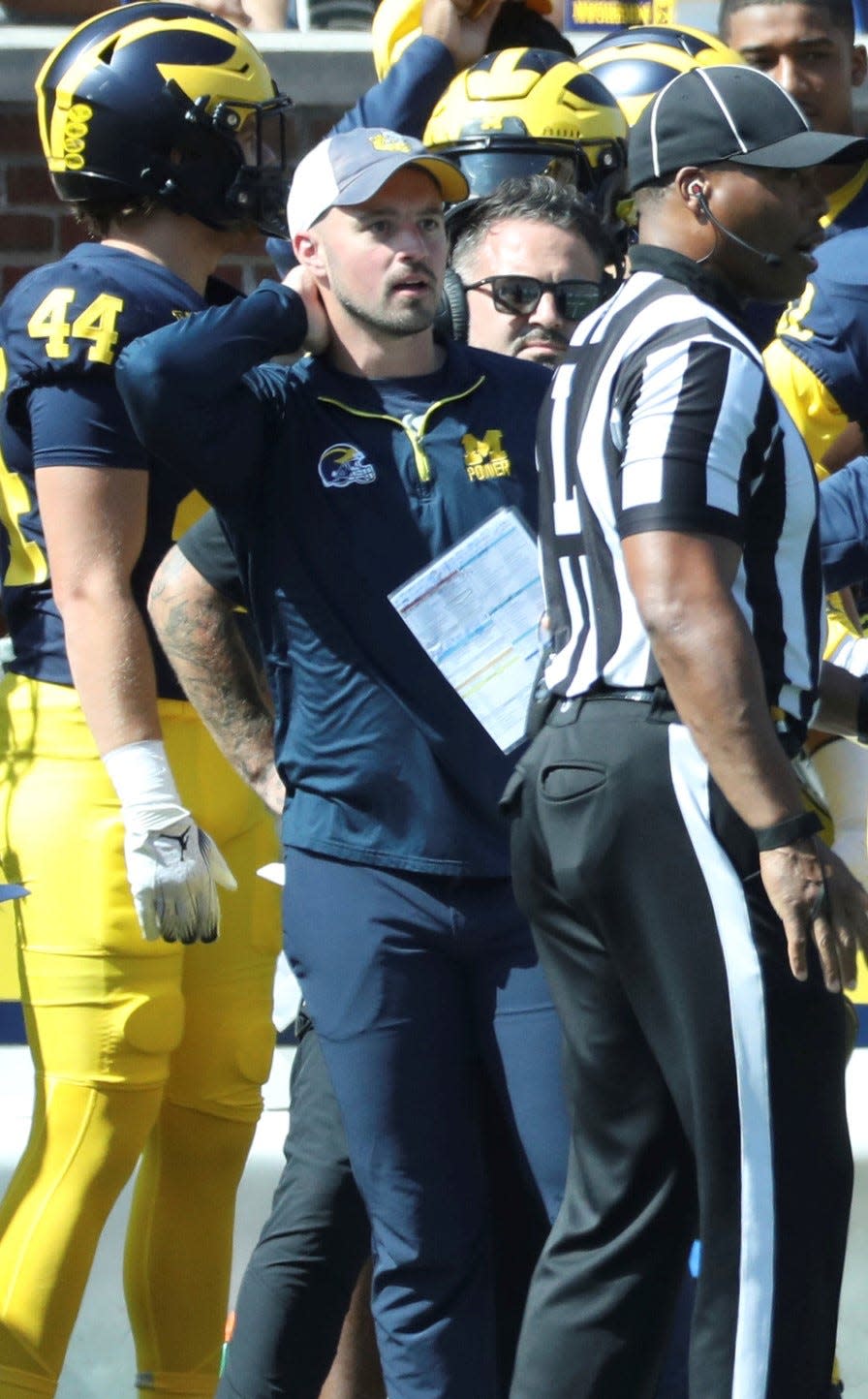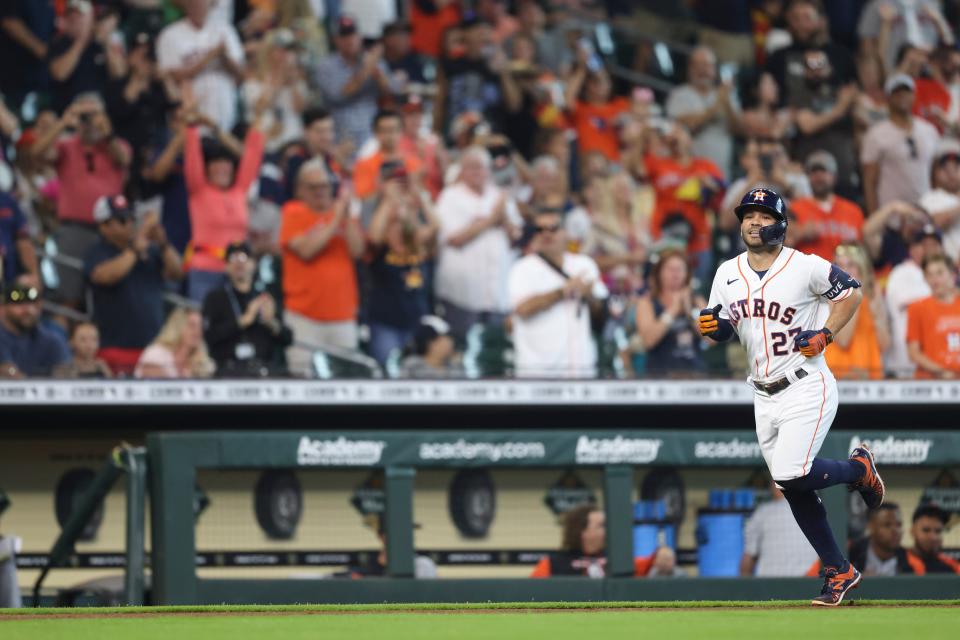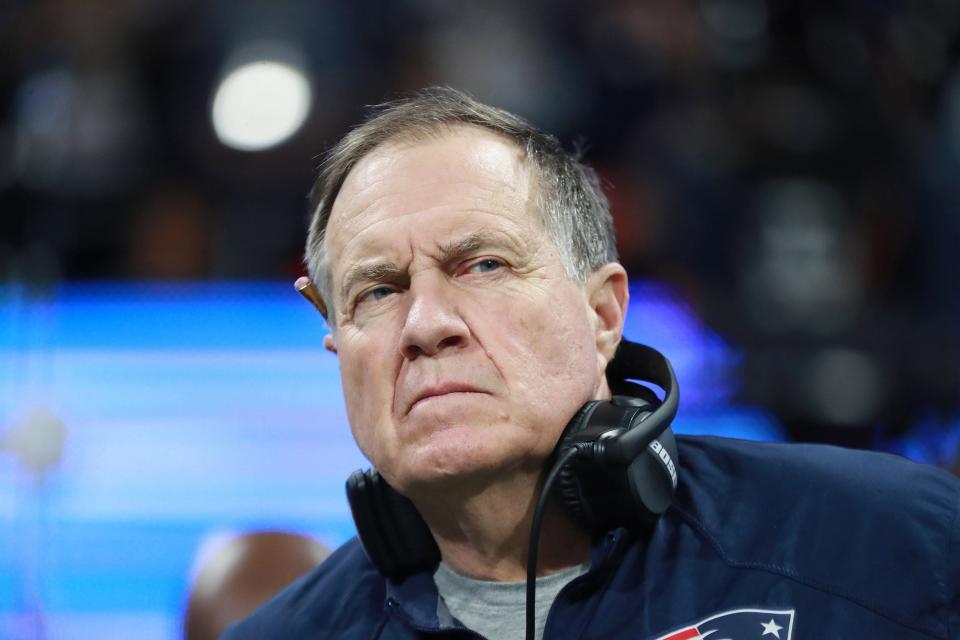How Michigan football allegations compare to Patriots, Astros sign-stealing scandals

Michigan football finds itself in the national spotlight again for something other than its 8-0 start to the 2023 season.
The Wolverines are under NCAA investigation again, this time because of alleged sign-stealing using in-person scouts at other Big Ten games in violation of NCAA rules. It reportedly also includes video evidence of electronics used to steal signs, which is prohibited.
Wolverines analyst, Connor Stalions, is the center of the investigation so far, and has been suspended, with pay, by the university. Stalions, a former Marine Captain, joined Michigan in May 2022 as an analyst and had his computer searched during the investigation.
ESPN reported Monday that Stalions had tickets in his own name for more than 30 games over the past seasons at 11 Big Ten schools. "Stalions forwarded the tickets he bought to at least three different people in different areas of the country," ESPN reported.
ANOTHER HEADACHE: Sign-stealing allegations against Michigan football cast a pall over its triumphant climb
A Big Ten school tapped into its in-stadium surveillance video from a game earlier in the 2023 season, and the person in the seat bought by Stalions held their phone up and appeared to film the home sideline the entire game, sources told ESPN.
Here’s how the allegations against Michigan compare with other historical investigations into illegal sign-stealing in recent sports history.
Michigan football

The NCAA is investigating the Wolverines for allegedly violating rules outlawing teams from scouting future opponents in-person, first reported by Yahoo! Sports on Oct. 19. The Big Ten confirmed the investigation in a statement and said Michigan’s future opponents were notified of possible illegal sign-stealing.
If the NCAA finds the allegations to be true, Michigan would have violated NCAA Bylaw 11.6.1, which states: "Off-campus, in-person scouting of future opponents (in the same season) is prohibited."
In-person scouting of future opponents was prohibited by the NCAA in 1994.
Using electronics to steal signs is also illegal in college football.
MUST LISTEN: Make 'Hail Yes' your go-to Michigan Wolverines podcast for all the best news, analysis, insights and opinions, available anywhere you listen to podcasts (Apple Podcasts, Spotify).
Stalions was named a person of interest in the investigation the next day in an ESPN report, hours after the NCAA investigation became public. NCAA investigators requested access to his computer for evidence of sign-stealing, and he deleted all social media accounts, including his LinkedIn, which said his job skills included “identifying the opponent's most likely course of action and most dangerous course of action.”
Michigan coach Jim Harbaugh denied the claim and said he and the coaching staff had no knowledge of what was alleged.
"I do not have any knowledge or information regarding the University of Michigan football program illegally stealing signals, nor have I directed any staff member or others to participate in an off-campus scouting assignment, Harbaugh said Oct. 18. "I have no awareness of anyone on our staff having done that or having directed that action."
The NCAA did not set a timeline for when the investigation would be complete.
TRENDING: Michigan football's Connor Stalions bought tickets to at least 30 Big Ten games
Houston Astros

The most infamous recent organized illegal sign-stealing in sports happened in baseball.
The Houston Astros, who have made the MLB playoffs every season since 2017, had an expansive system to steal opposing pitching signals during the 2017 and 2018 playoffs. The sign-stealing helped the Astros win the franchise’s first-ever World Series in 2017 and reach the ALCS in 2018.
The information became public in 2019 when former Houston pitcher Mike Fiers told The Athletic the details of how the Astros stole pitching signs. Fiers said the Astros used a camera in center field to identify the catcher’s signal for the pitch.
Astros staffers or players watching the video from behind the dugout would use audio cues, like banging a trash can or using a buzzer, to let the batter know which pitch was coming.
The MLB launched an investigation, which concluded in January 2020. The investigation confirmed the Astros used the sign-stealing system in 2017 and 2018, and MLB issued sanctions punishing Astros ownership and coaches, but not the players involved.
General manager Jeff Luhnow and manager A.J. Hinch were suspended for the 2020 season. The Astros were stripped of draft picks in 2020 and 2021 but retained the 2017 World Series title. Hinch was named Detroit Tigers manager in 2021.
Boston Red Sox

The Boston Red Sox were cited for illegally stealing signs on a smaller scale a year after the Astros began their scheme.
The MLB found the Red Sox in 2018 used a sign-stealing system during the regular season but it was far more limited than what the Astros were doing. The team's replay operator used a video replay room to decipher catcher signals during regular season games. Boston went onto win the World Series.
Red Sox manager Alex Cora was part of Houston's sign-stealing scheme in 2017 before he left for Boston, and was suspended for the 2020 season for his role with the Astros. He parted ways with Boston a day after the news of his involvement came out, but was re-hired for the 2021 season once his suspension was complete.
New England Patriots

The New England Patriots were the first sports team accused of using modern technology for an unfair advantage during its undefeated regular season in 2007.
The New York Jets during their Week 1 game vs. the Patriots apprehended a Patriots staffer and accused the team of videotaping coaching signals, a violation of NFL rules. Head coach Bill Belichick said he wasn’t aware that was against league rules since the tape was not being used in the same game, but league commissioner Roger Goodell determined it violated the league’s fair play rules after an investigation.
The investigation took three days before punishments were handed out. Belichick was fined $500,000, the largest fine in NFL history for a coach. The Patriots were fined $250,000 and stripped of their 2008 first-round pick.
The NFL also confiscated all video tapes and notes related to the incident and destroyed them before the public could see. Goodell confirmed there were video tapes from 2006 and 2007, but said other claims the Patriots used video surveillance ahead of the 2002 Super Bowl vs. the St. Louis Rams were false.
A 2015 ESPN story reported the Patriots' cheating was worse than people realized, with the Deflategate punishment in 2015 seen by some NFL owners as a "makeup call" for Spygate.
The Patriots' "spying" scheme involved undercover scouts attending games as members of the press, with media credentials listed as "Patriots TV" or "Kraft Productions" and prepped with excuses of what to say they were taping if asked by security.
This article originally appeared on Detroit Free Press: How Michigan football sign-stealing scandal compares to Pats, Astros
